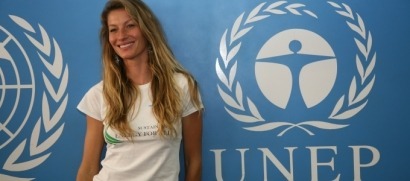
"Energy affects everything. Children can study at night when they have access to electricity. If we can bring electricity to everyone, we can help people to survive," she told a press conference at the UN Environment Programme's (UNEP) headquarters in Nairobi.
"It's unjust if people do not have access to electricity. Energy for all is achievable. Just 2 percent of global investment is needed," she added, speaking in the runup to the global launch of the International Year of Sustainable Energy for All (IYSEA).
Bündchen's visit to Kenya took her to Kibera, East Africa's largest slum, to look at biogas centers (turning human waste into power), to Kisumu, in western Kenya, where she took part in collecting firewood and learned about fuel-efficient cook stoves and to the Mount Kenya area where micro-hydro power is bringing electricity to over 2,000 households.
While gains have been made in accessing electricity in the past two decades, huge gaps still remain. One in every five people on the planet do not have access to electricity. In Sub-Saharan Africa some 70 percent of the population have no electricity, while in Kenya only 18 percent of households have power.
Access to adequate fuels for cooking is also a major challenge, with many families still dependent on wood which produces toxic smoke, impacting the health of women and children. Around half the world's population cook on open indoor fires and each year over 2.5 million people die prematurely as a result of breathing in emissions from these cook stoves, primarily from a substance called black carbon, also known as soot.
Many more are blighted by ill health, such as chronic bronchitis. Meanwhile, black carbon is emerging as an important climate change pollutant and is also implicated in crop damage.
"We don't hear about this and yet the solutions are so simple," added Bündchen, who has recently been named the 'world's greenest celebrity'. "When we come out of our bubbles and travel, you experience what I did in Kenya and it's amazing how we can change our viewpoints You ask, what can we do in our daily lives to make change? Everybody can help in a different way," she said.
UN Under Secretary General and UNEP Executive Director Achim Steiner said Bündchen “speaks for the issues and she speaks from the heart.”
“We were lucky to get her as a Goodwill Ambassador,” Steiner continued. “It's important to go out and meet people, which is part of making someone a great ambassador who can in turn communicate to millions of people that, for example, sustainable energy for all is possible, that it is one powerful way of motivating and catalyzing positive change in the run-up to Rio+20 in June this year."
"We need to change our way of thinking and not think globally but locally. In Africa two thirds of the population still do not have access to energy. There are solutions at the local and community levels. I have a dream that with photovoltaic energy we can build grids up from the bottom and that one day we will see rural areas generating electricity and selling energy to the cities," he added.
Kenya is increasingly developing its geothermal, wind, solar and hydro power resources at the local level.
UNEP has worked to realize and to accelerate the use of renewable energies within the overall theme of a Green Economy, with a special emphasis on Africa, and Kenya in particular. The UN's new office facility in Nairobi, which Ms. Bündchen visited and which houses UNEP and UN-HABITAT, has 6,000 square meters of solar panels and generates as much electricity as its 1,200 occupants consume.
Bündchen became a UNEP Goodwill Ambassador in 2009.
For additional information:

